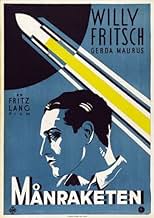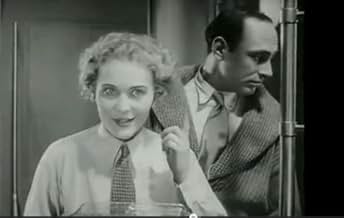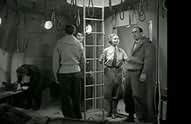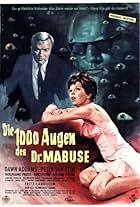A tenacious scientist blasts off for the moon in hopes of riches that may be found there.A tenacious scientist blasts off for the moon in hopes of riches that may be found there.A tenacious scientist blasts off for the moon in hopes of riches that may be found there.
- Awards
- 1 nomination
Gustl Gstettenbaur
- Gustav
- (as Gustl Stark-Gstettenbaur)
Gustav von Wangenheim
- Hans Windegger - Engineer
- (as Gustav v. Wangenheim)
Alexa von Porembsky
- Eine Veilchenverkäuferin
- (as Alexa v. Porembska)
Heinrich Gotho
- Der Mieter vom II. Stock
- (as Gotho)
Alfred Loretto
- Zwei eindeutige Existenzen
- (as Loretto)
Max Maximilian
- Grotjan, Chauffeur bei Helius
- (as Maximilian)
Edgar Pauly
- Zwei eindeutige Existenzen
- (as Pauly)
Karl Platen
- Der Mann am Mikrophon
- (as Platen)
Mahmud Terja Bey
- Fünf Gehirne und Scheckbücher
- (as Terja Bey)
Hermann Vallentin
- Fünf Gehirne und Scheckbücher
- (as Vallentin)
Storyline
Did you know
- TriviaThis film shows the first countdown to the launch of a rocket - not just the first one in a movie, but the first ever. It was invented as a dramatic device for the movie. Previously, all launches were begun with a count upward from zero to a designated number (usually ten). Also depicted for the first time are the use of liquid rocket fuel, a rocket with two stages, and zero gravity in space.
- GoofsWhen Helius listens for Friede's heartbeat, fearing that the launch may have killed her, we can see her breathing heavily.
- Quotes
[Opening intertitle]
The Author: "Never" does not exist for the human mind... only "Not yet."
- Crazy creditsFritz Rasp is billed in the opening credits as "Der Mann, der sich Walter Turner nennt" or "The man who calls himself Walter Turner."
- Alternate versionsThe film was given a release from Kino Internation on DVD, running a length of 169 minutes. The 2000 restoration runs 200 minutes. The original showing in the United States ran 156 minutes and was later cut to 95 minutes.
- ConnectionsEdited into Histoire(s) du cinéma: Le contrôle de l'univers (1999)
- SoundtracksHeimlich singt für uns die Liebe
Music by Willy Schmidt-Gentner
Lyrics by Fritz Rotter
Sung by Gerda Maurus and Willy Fritsch
Featured review
Silent films have always intrigued me, not all of them have held up but even then it is not to not appreciate what they tried to do. Those that do hold up though manage to be good and more films, and the best remarkable for their time and influential in cinema and their genres. Also like to love a lot of Fritz Lang's work, his best and most influential being 'Metropolis' and 'M' and 'You Only Live Once' and 'Scarlet Street' are also fabulous films.
'The Woman in the Moon' is not one of the best silent films. It is not one of Lang's best. And it is not one of the best of its genre. Other films at the time in all three respects have aged better by today's standards and in no way is that meant to sound ignorant or disrespectful, just my thoughts. 'The Woman in the Moon' is though very interesting if lesser Lang, with a number of standout things that still impress. In no way is it a bad film and really do appreciate the amount of effort that went into it.
It is a fairly easy film to criticise. It does have quite severe pacing problems, the overstretching of the plot really making the film drag badly. What would have made things better was if the film was much shorter as it does feel at least half an hour too long.
What particularly made 'The Woman in the Moon' feel like that was the romance, which is really not all that interesting, is pretty simplistic and is quite melodramatic. Further disadvantaged by being over-acted to the heavens by the actors. The professor character is also on the histrionic side.
Conversely, 'The Woman in the Moon' is hugely impressive visually still. There is a lot of atmospheric and very stylish camera work and the design and effects still look imaginative and like a lot of creativity went into making them. The take-off especially is pretty jaw-dropping in this aspect. Lang's direction shows enough flashes of brilliance, with some inspired sinister touches. The later interpolated music score is haunting and moves things along with a good sense of pace and atmosphere.
Although narratively the story is inconsistent, there are fine moments with the more scientific space-oriented element to it actually being quite intriguing and leaving one in awe. The build up to the take-off has tension, and, on top of being the most visually inspired the film gets, the take-off itself evokes thrills and jaws will likely drop looking at how good it still looks and how creatively it's handled.
On the whole, interesting but uneven and lesser Lang. 6/10
'The Woman in the Moon' is not one of the best silent films. It is not one of Lang's best. And it is not one of the best of its genre. Other films at the time in all three respects have aged better by today's standards and in no way is that meant to sound ignorant or disrespectful, just my thoughts. 'The Woman in the Moon' is though very interesting if lesser Lang, with a number of standout things that still impress. In no way is it a bad film and really do appreciate the amount of effort that went into it.
It is a fairly easy film to criticise. It does have quite severe pacing problems, the overstretching of the plot really making the film drag badly. What would have made things better was if the film was much shorter as it does feel at least half an hour too long.
What particularly made 'The Woman in the Moon' feel like that was the romance, which is really not all that interesting, is pretty simplistic and is quite melodramatic. Further disadvantaged by being over-acted to the heavens by the actors. The professor character is also on the histrionic side.
Conversely, 'The Woman in the Moon' is hugely impressive visually still. There is a lot of atmospheric and very stylish camera work and the design and effects still look imaginative and like a lot of creativity went into making them. The take-off especially is pretty jaw-dropping in this aspect. Lang's direction shows enough flashes of brilliance, with some inspired sinister touches. The later interpolated music score is haunting and moves things along with a good sense of pace and atmosphere.
Although narratively the story is inconsistent, there are fine moments with the more scientific space-oriented element to it actually being quite intriguing and leaving one in awe. The build up to the take-off has tension, and, on top of being the most visually inspired the film gets, the take-off itself evokes thrills and jaws will likely drop looking at how good it still looks and how creatively it's handled.
On the whole, interesting but uneven and lesser Lang. 6/10
- TheLittleSongbird
- Feb 17, 2020
- Permalink
- How long is Woman in the Moon?Powered by Alexa
Details
- Runtime1 hour 35 minutes
- Sound mix
- Aspect ratio
- 1.33 : 1
Contribute to this page
Suggest an edit or add missing content































